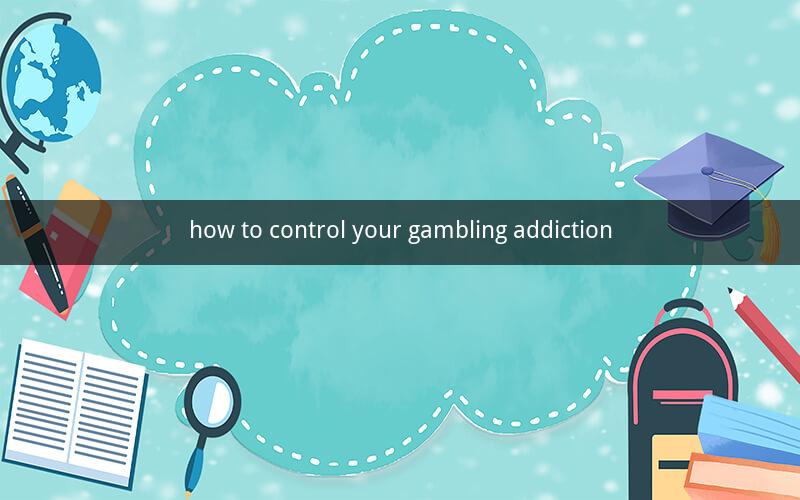
How to Control Your Gambling Addiction
Table of Contents
1. Understanding Gambling Addiction
2. Recognizing the Signs
3. The Impact of Gambling Addiction
4. Strategies to Control Your Gambling Addiction
- Seeking Professional Help
- Setting Clear Limits
- Developing Healthy Coping Mechanisms
- Building a Support System
5. Support Groups and Resources
6. Conclusion
1. Understanding Gambling Addiction
Gambling addiction, also known as compulsive gambling, is a condition characterized by an irresistible urge to gamble, despite the negative consequences. It is a complex disorder that affects both the individual and their loved ones. Understanding the nature of gambling addiction is crucial in developing effective strategies to control it.
2. Recognizing the Signs
Identifying the signs of gambling addiction is the first step towards taking control of the problem. Some common signs include:
- Spending more time and money on gambling than intended
- Feeling restless or irritable when unable to gamble
- Borrowing money or selling personal belongings to fund gambling activities
- Continuing to gamble despite financial, relationship, or legal problems
- Trying to conceal gambling activities from others
3. The Impact of Gambling Addiction
Gambling addiction can have severe consequences on various aspects of a person's life. Some of the impacts include:
- Financial problems:Gambling addiction can lead to significant financial loss, resulting in debt, bankruptcy, and even homelessness.
- Relationships:Gambling addiction can strain relationships with family, friends, and partners, leading to isolation and loneliness.
- Mental health:Compulsive gambling can contribute to mental health issues such as depression, anxiety, and substance abuse.
- Legal problems:Gambling addiction may lead to illegal activities to fund gambling habits, such as fraud or theft.
4. Strategies to Control Your Gambling Addiction
Controlling gambling addiction requires a multifaceted approach, involving various strategies and support systems. Here are some effective methods:
4.1 Seeking Professional Help
Professional help is crucial in treating gambling addiction. A therapist or counselor can provide personalized guidance and support. Some common treatment options include:
- Cognitive-behavioral therapy (CBT):This therapy helps individuals identify and change negative thought patterns and behaviors associated with gambling.
- Contingency management:This approach uses rewards and incentives to encourage positive behavior and reduce gambling.
- Motivational interviewing:This technique helps individuals explore their readiness to change and overcome obstacles to treatment.
4.2 Setting Clear Limits
Establishing clear limits on gambling activities is essential in controlling addiction. This may include:
- Setting a budget for gambling expenses
- Limiting the time spent on gambling activities
- Avoiding high-risk situations, such as visiting casinos or placing bets on credit
4.3 Developing Healthy Coping Mechanisms
Finding healthier ways to cope with stress and emotions can help reduce the urge to gamble. Some coping mechanisms include:
- Engaging in physical activities, such as exercise or yoga
- Participating in hobbies or interests
- Seeking social support from friends and family
4.4 Building a Support System
Surrounding yourself with a supportive network can provide encouragement and guidance during the recovery process. This may involve:
- Joining a support group for individuals with gambling addiction
- Seeking help from a sponsor or mentor
- Establishing boundaries with friends and family who may enable gambling behavior
5. Support Groups and Resources
Support groups and resources can be invaluable in the journey towards recovery. Some options include:
- Gamblers Anonymous:This is a fellowship of individuals who share their experience, strength, and hope with each other.
- National Council on Problem Gambling:This organization provides resources and support for individuals struggling with gambling addiction.
- Online forums and communities:There are numerous online platforms where individuals can find support and share their experiences.
6. Conclusion
Controlling gambling addiction is a challenging yet achievable goal. By understanding the nature of the addiction, recognizing the signs, and implementing effective strategies, individuals can take control of their gambling habits and improve their quality of life. Seeking professional help, setting clear limits, developing healthy coping mechanisms, and building a support system are essential steps in overcoming this addiction.
Questions and Answers:
1. What is the difference between gambling and gambling addiction?
- Gambling is a recreational activity, while gambling addiction is a compulsive behavior characterized by an irresistible urge to gamble, despite negative consequences.
2. How can I determine if I have a gambling addiction?
- Look for signs such as spending excessive time and money on gambling, feeling restless without gambling, and experiencing financial, relationship, or legal problems due to gambling.
3. Can I overcome gambling addiction on my own?
- While it is possible to make progress in overcoming gambling addiction on your own, seeking professional help and joining support groups can significantly improve your chances of recovery.
4. What are some common treatment options for gambling addiction?
- Treatment options include cognitive-behavioral therapy, contingency management, motivational interviewing, and support groups.
5. How can I set clear limits on my gambling activities?
- Set a budget for gambling expenses, limit the time spent on gambling, and avoid high-risk situations.
6. What are some healthy coping mechanisms for gambling addiction?
- Engaging in physical activities, hobbies, and seeking social support from friends and family can help reduce the urge to gamble.
7. Can my loved ones help me overcome gambling addiction?
- Yes, your loved ones can play a significant role in supporting your recovery by offering encouragement, establishing boundaries, and providing emotional support.
8. Are there support groups available for individuals with gambling addiction?
- Yes, Gamblers Anonymous and other support groups provide a platform for individuals to share their experiences and receive support.
9. How can I find a therapist or counselor to help me with my gambling addiction?
- You can seek referrals from your primary care physician, mental health professionals, or support groups. Additionally, online directories can help you find therapists specializing in gambling addiction.
10. Can I recover from gambling addiction completely?
- Yes, recovery from gambling addiction is possible. With ongoing effort, support, and treatment, individuals can achieve long-term recovery and lead a fulfilling life.